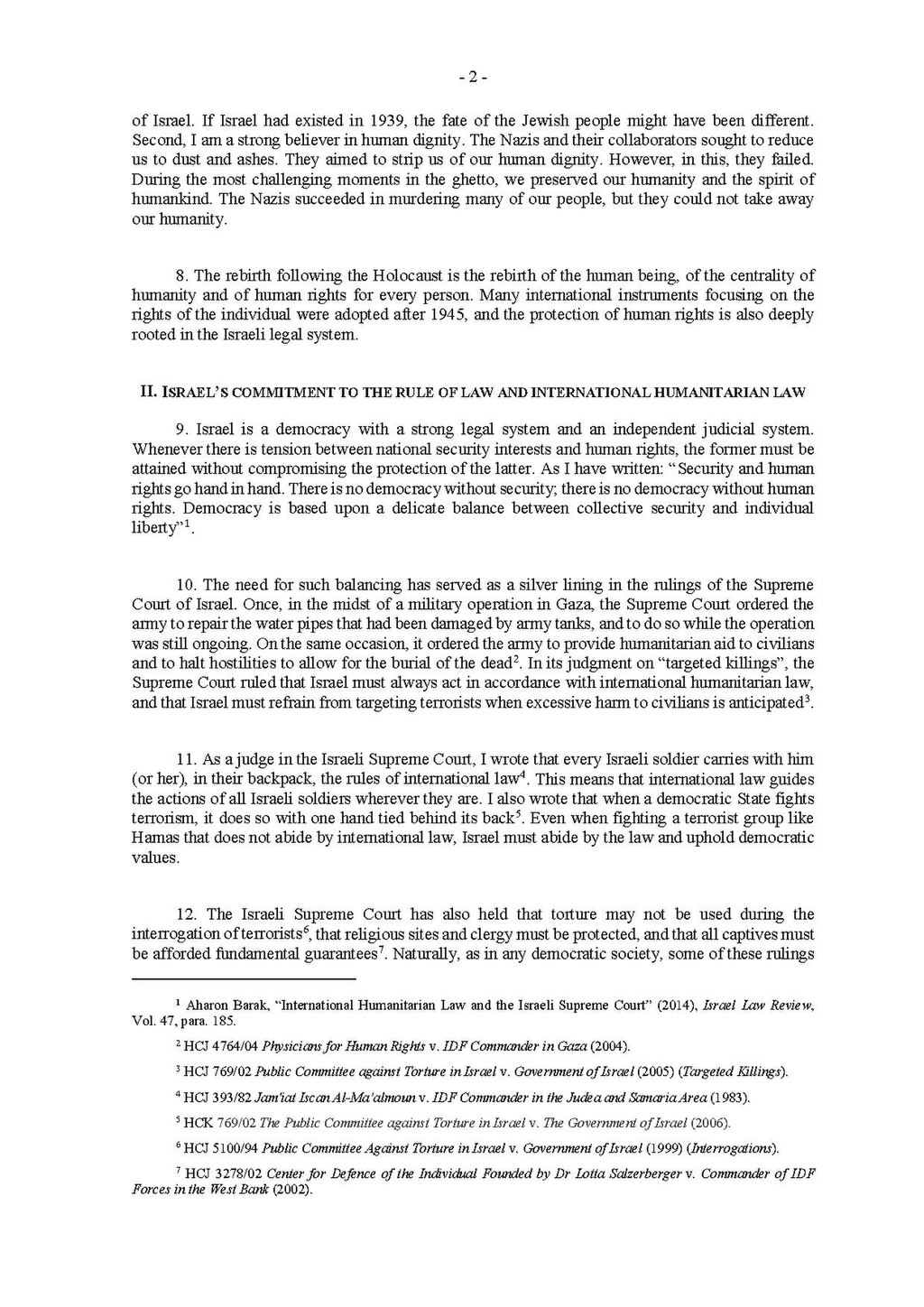- 2 -
of Israel. If Israel had existed in 1939, the fate of the Jewish people might have been different. Second, I am a strong believer in human dignity. The Nazis and their collaborators sought to reduce us to dust and ashes. They aimed to strip us of our human dignity. However, in this, they failed. During the most challenging moments in the ghetto, we preserved our humanity and the spirit of humankind. The Nazis succeeded in murdering many of our people, but they could not take away our humanity.
8. The rebirth following the Holocaust is the rebirth of the human being, of the centrality of humanity and of human rights for every person. Many international instruments focusing on the rights of the individual were adopted after 1945, and the protection of human rights is also deeply rooted in the Israeli legal system.
II. Israel’s commitment to the rule of law and international humanitarian law
9. Israel is a democracy with a strong legal system and an independent judicial system. Whenever there is tension between national security interests and human rights, the former must be attained without compromising the protection of the latter. As I have written: “Security and human rights go hand in hand. There is no democracy without security; there is no democracy without human rights. Democracy is based upon a delicate balance between collective security and individual liberty”[1].
10. The need for such balancing has served as a silver lining in the rulings of the Supreme Court of Israel. Once, in the midst of a military operation in Gaza, the Supreme Court ordered the army to repair the water pipes that had been damaged by army tanks, and to do so while the operation was still ongoing. On the same occasion, it ordered the army to provide humanitarian aid to civilians and to halt hostilities to allow for the burial of the dead[2]. In its judgment on “targeted killings”, the Supreme Court ruled that Israel must always act in accordance with international humanitarian law, and that Israel must refrain from targeting terrorists when excessive harm to civilians is anticipated[3].
11. As a judge in the Israeli Supreme Court, I wrote that every Israeli soldier carries with him (or her), in their backpack, the rules of international law[4]. This means that international law guides the actions of all Israeli soldiers wherever they are. I also wrote that when a democratic State fights terrorism, it does so with one hand tied behind its back[5]. Even when fighting a terrorist group like Hamas that does not abide by international law, Israel must abide by the law and uphold democratic values.
12. The Israeli Supreme Court has also held that torture may not be used during the interrogation of terrorists[6], that religious sites and clergy must be protected, and that all captives must be afforded fundamental guarantees[7]. Naturally, as in any democratic society, some of these rulings
- ↑ Aharon Barak, “International Humanitarian Law and the Israeli Supreme Court” (2014), Israel Law Review, Vol. 47, para. 185.
- ↑ HCJ 4764/04 Physicians for Human Rights v. IDF Commander in Gaza (2004).
- ↑ HCJ 769/02 Public Committee against Torture in Israel v. Government of Israel (2005) (Targeted Killings).
- ↑ HCJ 393/82 Jam’iat Iscan Al-Ma’almoun v. IDF Commander in the Judea and Samaria Area (1983).
- ↑ HCK 769/02 The Public Committee against Torture in Israel v. The Government of Israel (2006).
- ↑ HCJ 5100/94 Public Committee Against Torture in Israel v. Government of Israel (1999) (Interrogations).
- ↑ HCJ 3278/02 Center for Defence of the Individual Founded by Dr Lotta Salzerberger v. Commander of IDF Forces in the West Bank (2002).

